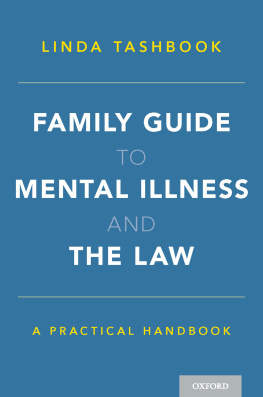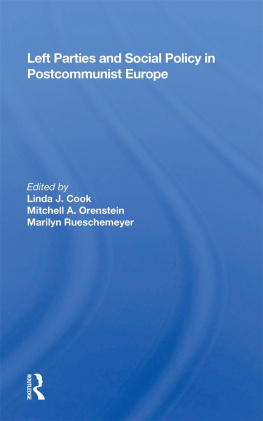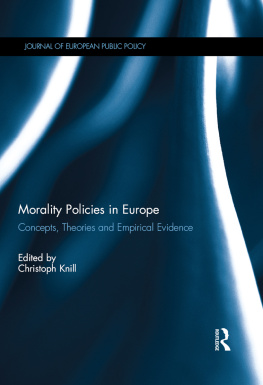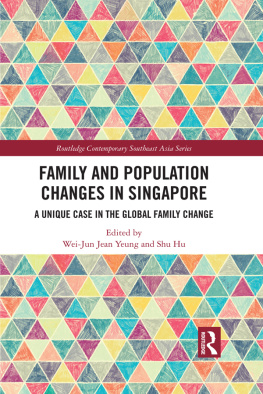FAMILIES AND FAMILY POLICIES IN EUROPE
Also by Linda Hantrais
Le vocabulaire de Georges Brassens, vol. 1 Une etude statistique et stylistique, vol. 2 Concordance et index des rimes
Contemporary French Society
The Undergraduates Guide to Studying Languages
Managing Professional and Family Life: a Comparative Study of British and French Women
Social Policy in the European Union
(Edited with Steen Mangen) Cross-National Research Methods in the Social Sciences
Families and Family Policies in Europe
Linda Hantrais and Marie-Thrse Letablier
First published 1996 by Addison Wesley Longman Limited
Published 2014 by Routledge
2 Park Square, Milton Park, Abingdon, Oxon 0X14 4RN
711 Third Avenue, New York, NY 10017, USA
Routledge is an imprint of the Taylor and Francis Group, an informa business
1996 Linda Hantrais and Marie-Thrse Letablier
All rights reserved. No part of this book may be reprinted or reproduced or utilised in any form or by any electronic, mechanical, or other means, now known or hereafter invented, including photocopying and recording, or in any information storage or retrieval system, without permission in writing from the publishers.
Notices
Knowledge and best practice in this field are constantly changing. As new research and experience broaden our understanding, changes in research methods, professional practices, or medical treatment may become necessary.
Practitioners and researchers must always rely on their own experience and knowledge in evaluating and using any information, methods, compounds, or experiments described herein. In using such information or methods they should be mindful of their own safety and the safety of others, including parties for whom they have a professional responsibility.
To the fullest extent of the law, neither the Publisher nor the authors, contributors, or editors, assume any liability for any injury and/or damage to persons or property as a matter of products liability, negligence or otherwise, or from any use or operation of any methods, products, instructions, or ideas contained in the material herein.
ISBN 13: 978-0-582-24767-3 (pbk)
British Library Cataloguing-in-Publication Data
A catalogue record for this book is available from the British Library.
Library of Congress Cataloguing-in-Publication Data
Hantrais, Linda.
Families and family policies in Europe / Linda
Hantrais and Marie-Thrse Letablier.
p. cm.
Includes bibliographical references and index.
ISBN 0-582-24767-5
1. FamilyEurope. 2. Family policyEurope.
I. Letablier, Marie-Thrse. IL Title.
HQ612.H36 1996
306.85094dc20 95-45061
CIP
| A | Austria |
| B | Belgium |
| DK | Denmark |
| SF | Finland |
| F | France |
| D | Germany |
| GR | Greece |
| IRL | Ireland |
| I | Italy |
| L | Luxembourg |
| NL | Netherlands |
| P | Portugal |
| E | Spain |
| S | Sweden |
| UK | United Kingdom |
| EUR | Europe |
Demographic trends affecting family formation and structure in the member states of the European Union (EU) would appear to be moving in the same direction, and governments are generally thought to be facing similar social problems requiring similar policy responses. Within the Union, each member state organises social welfare according to its own socio-economic and political circumstances and cultural traditions, and the place of families within national social policy reflects the different ways that governments and public opinion conceptualise family affairs. These differences may help to explain why convergence of family structures does not seem to have occurred automatically across the Union and why family policy has not been given prominence in the European political agenda for social affairs. The reluctance of the Council of Ministers to demonstrate a firm commitment in this area can be interpreted as an indication of the lack of agreement among members states over not only the objectives and content of family policies but also family policy as a concept.
Although the body of literature on families expanded rapidly across the Union from the 1980s and was given a new boost, particularly within the European context, when the United Nations proclaimed 1994 as the International Year of the Family, few attempts have been made to compare and contrast family structures and family policies across the Union.
Since the late 1980s, regular annual reports have been produced by the European Observatory on National Family Policies and the European Commission Network on Childcare and other Measures to Reconcile Employment and Family Responsibilities, and studies have been commissioned on benefits and child support in Europe. Yet, no systematic comparative analysis has been undertaken hitherto of the concepts underlying family policies at either European or national level. The present volume seeks to fill this gap by exploring how family structures, the relationship between the family and employment, and family policy are conceptualised in individual member states and at European level, by re-examining theories about the convergence of family and family policy models and by analysing national and EU policy responses to common social problems.
The book is the outcome of a collaborative project carried out between 1993 and 1995, supported by awards from the Economic and Social Research Council (R000221159), the European Commission, Directorate General V, Employment, Industrial Relations and Social Affairs, and the Caisse Nationale des Allocations Familiales in Paris, within the framework of an initiative on comparisons of family policies in Europe. The aim of the project was to contribute to a greater understanding of national conceptualisations of the family and the operation of the family policy-making process at European level and within different national contexts. Since the book deals with a large body of information that is undergoing rapid and constant change, we have not sought to be comprehensive; rather the focus is on trends and patterns of behaviour that are of interest from a cross-cultural perspective.
Our thanks are due to the three organisations that made the project possible and to our many collaborators, particularly those in Finland, France, Germany, Italy, Spain, Sweden and the United Kingdom, and at Eurostat, who generously contributed their time, knowledge and expertise. Any errors of interpretation of their reports, of other national materials and European documentation remain our own.
Linda Hantrais and Marie-Thrse Letablier
October 1995
The period from the 1960s to the 1990s saw intense social change in advanced industrial societies that called into question the core social institutions, not least the family. The extent and pace of change, the timing of key events acting as catalysts for change, as well as national perceptions of social trends, differed, however, from one socio-cultural context to another, prompting fundamental questions to be asked about the structure and role of families in society: What is the family? Is it universal? Is the State the creator or destroyer of family solidarity? Is the family in a state of crisis? Does the family exist? These questions (by Gittins, 1993, with reference to Britain; and Roussel, 1989, in the French context), echoed others that had been raised more than two decades earlier about whether the family was likely to survive (Cooper, 1972).










